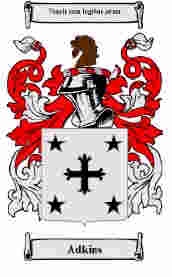|
|
||
|
HISTORIOGRAPHY ADKINS AND ADKINS' COAT OF ARMS
|
||
|
Individual surnames originated for the purpose of more specific identification; the four primary sources for second names were: occupation, location, father's name, or personal characteristics. The surname ADKINS appears to be patronymical in origin, and is believed to be associated with the meaning, "son of Adkins", or "descendant of little Ad." Dictionaries of surnames indicate probable spelling variations of ADKINS to be: Adkin, Atkins, Atkinson, Aitkins, Aitken, Aiken, Atkyns, Atkyn. Different spellings of the same original surname are a common occurrence Although bearers of the old and distinguished ADKINS name comprise a small fraction of the population, there are a number who have established for it a significant place in history. They include the following One of the earliest records of the name appeared in the Pipe Rolls of Norfolk, England, in 1191. These Pipe Rolls were records of taxes and revenues under the auspices of the local sheriff. William ATKYNS was listed in subsidy rolls of Warwickshire in 1332; John ADEKYNES appeared in records in Worcestershire in 1327 and in 1441, William ATKINS appeared as a member of the staff of a manor in Sheffield, England Robert ADKINS (1626-1685), Ejected minister, who was a fellow of Wadham College in Oxford, where his preaching attracted much attention. Between 1653 and 1657, he wa5Chaplain to Oliver Cromwell and minister of Theydon. This Robert Adkins was an eminent teacher and divine, but opinions of Cromwell vary widely. He was known to say, after his cruelly punitive expedition to Ireland, "I am persuaded that this is a righteous judgment of God upon those barbarous wretches. Henry Adkins (ATKINS) (1558-1635) M.D. Physician who graduated from Oxford and received his M.D. from Nantes. He was president of the College of Physicians six times between 1607 and 1625, and attended Henry, Prince of Wales, in his last illness in 1612 Samuel Adkins (Atkins) (1787-1808) Marine painter who contributed to the Royal Academy between1787 and 1796. Between 1796 and 1804, he was in the East Indies, and exhibited there until 1808. John Tracy Adkins (c.-1700) English lawyer and judge who was called to the bar in 1732. He was appointed Baron of the Exchequer in 1755. His reports of Cases Argued and determined in Chancery from 1736 to 1754 are considered good authority Eleanor Adkins (Adkinson) ("1863) American writer who was the author of "Mazelle Fifine" Written in 1903, and "Greyfriars Bobby" written in 1912. The Adkins surname became well known in Scotland at the turn of the 15th Century, and a person by the name of John ATKYNS was an important merchant there in 1405. This man is on record as having petitioned for the return of his ships and goods, which were illegally seized by the British. This shows evidence of the many battles which occurred between the English and the Scots in those days. Another Scot by the name of, Samuel ADKINS was Commissioner of Supply for the city of Edinburgh in 1655. During the colonial period of American history, Joseph ADKINS arrived from Sandwich, Kent, England. He came to Newburyport, Massachusetts, in 1728 There were four different coat of arms granted to the name. Family mottos are believed to have originated as battle cries in medieval times. A motto was not recorded with the family. The ADKINS coat-of-arms was drawn by an heraldic artist from information officially recorded in ancient heraldic archives. Documentation for the ADKINS coat-of-arms design can be found in RIETSTAP ARMORIAL GENERAL. Heraldic artists of old developed their own unique language to describe an individual coat-of-arms. In their language, the ARMS (shield) is as follows: "Em. in chief two lions ramp. az." Above the shield and helmet is the Crest, which is described as:
When translated, the blazon also describes the original colors of the ADKINS Arms and Crest as it appeared centuries ago.
|
||
